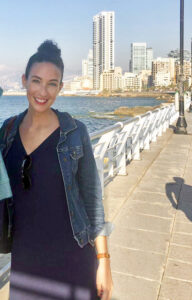Former Hansen tutor describes devastation in Beirut
By Candace ParisLauren Caliri loves living in Beirut and speaks passionately about the beauty of Lebanon and the generosity of its people. She is deeply moved by the suffering caused by last week’s massive explosion at the city’s port. “What you see on TV,” she said, “it’s so much worse.”
A Rhode Island native, Caliri has been living in Beirut since March 2019. As part of fulfilling requirements for a certificate program, she had previously worked as a behavior specialist and Applied Behavior Analysis (ABA) tutor in the Canton Public Schools, mostly at Hansen Elementary, from 2014 to 2017. (ABA is a set of techniques used to promote skill development and social behaviors in people on the autism spectrum.) Upon completing her certificate and master’s degree, she worked at a school in Worcester. While there, she learned of an opportunity to work one-on-one, full-time with a child in Lebanon. Following a Skype interview, Caliri was offered the job and relocated within three weeks.
As it happens, Caliri and the child’s family were away when the blast occurred on Tuesday, August 4. This may have saved their lives because the exploding 2,750 metric tons of ammonium nitrate caused widespread destruction, injuries and deaths. They have not yet returned to Beirut.
“Thank God we weren’t there,” Caliri commented, noting that severe damage extended several miles away from the explosion. “It looks like the aftermath of an earthquake. It’s really sad.”
The school that the child attends, accompanied by Caliri, was completely destroyed, with only the walls left standing. A friend staying in Caliri’s apartment — less than two miles from the blast — and luckily not there at the time, reported that all the windows were broken, although the building remains intact. A ground level home furnishings store was obliterated, but no one was injured.
Describing how another friend’s home was completely destroyed, Caliri noted that older neighborhoods fared much worse. She said that recently, with the quarantine in effect, she had enjoyed going for walks to look at the older architectural styles, photographing the most beautiful buildings. Now, she is saddened that many of those buildings are simply gone.
“One of the things I’m so shocked by is that there weren’t more deaths,” Caliri said.
She knows that friends of friends died. Exploding glass posed a particular threat; people also died as a result of collapsing buildings and of debris falling on cars. One friend of hers, playing tennis miles away from the blast, was thrown to the ground three meters away by the force of the explosion but not hurt. Other friends were injured; she doesn’t know the condition of one who lived in the worst hit area.
Even before the explosion, many people in Lebanon were “already in a bad state” because of economic disruption, Caliri said. Civil protests, initially in opposition to planned taxes, had started last fall. The protests escalated over government corruption; some violent clashes took place, and this period became known as the October Revolution. Protests and occasional violence have continued off and on since then. The value of the Lebanese lira (pound) has depreciated, and many people have lost jobs and are experiencing hunger. Power cuts have added to the stress.
Despite the problems, Caliri is definite about wanting to return to Beirut; she is scheduled to stay at least until March. “It’s a weird feeling,” she said. “There’s so much to be done. I wish I could help.”
She is considering how she might be of assistance, noting, “The Lebanese people are so welcoming and giving; even the poorest people are always going to help a neighbor.”
Caliri has traveled beyond Beirut. “I’ve tried to see as much as I can,” she said. “It’s a beautiful country.” She has hiked and visited beaches and the cedar forests in the north. She noted that the famous Lebanese cedar is so important to the culture that it’s on the national flag.
In Beirut, one of Caliri’s favorite activities is walking along the water near the port, alone or with the child she works with. She doesn’t know if any of the walkway remains and said it was likely severely damaged, along with downtown Beirut and the neighborhoods of Gemmayzeh, Mar Mikhael, and Achrafieh. She noted, “I’m very lucky. I have options and can always go home to the U.S. Many can’t leave.”
Caliri encouraged anyone interested in helping to send money. She said that since the port is destroyed, shipping is not currently feasible. She recommended the following organizations: Impact Lebanon (impactlebanon.org), Lebanese Red Cross (supportlrc.app/donate) and Live Love (livelove.org).
Short URL: https://www.thecantoncitizen.com/?p=69022











